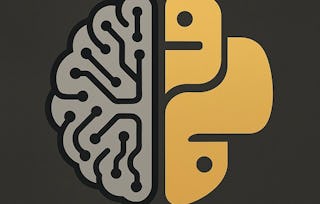Introduction to Machine Learning: Unsupervised Learning explores how machines uncover structure, patterns, and relationships in data without labeled outcomes. In this course, you’ll learn how to analyze and visualize high-dimensional data using Principal Component Analysis, discover natural groupings through clustering methods like K-Means and hierarchical clustering, and tackle real-world challenges such as missing data and recommender systems. Through hands-on practice and thoughtful interpretation, you’ll build the intuition and practical skills needed to extract insight from complex, unlabeled datasets.

Introduction to Machine Learning: Unsupervised Learning
Seize the savings! Get 40% off 3 months of Coursera Plus and full access to thousands of courses.

Introduction to Machine Learning: Unsupervised Learning
This course is part of Machine Learning: Theory and Hands-on Practice with Python Specialization

Instructor: Daniel E. Acuna
Included with
Recommended experience
What you'll learn
Explain the goals, challenges, and appropriate use cases of unsupervised learning.
Apply dimensionality reduction techniques to analyze and visualize high-dimensional data.
Discover and interpret structure in data using clustering methods.
Address missing data and recommender system problems using matrix completion techniques.
Skills you'll gain
Details to know

Add to your LinkedIn profile
January 2026
6 assignments
See how employees at top companies are mastering in-demand skills

Build your subject-matter expertise
- Learn new concepts from industry experts
- Gain a foundational understanding of a subject or tool
- Develop job-relevant skills with hands-on projects
- Earn a shareable career certificate

There are 5 modules in this course
Welcome to Introduction to Machine Learning: Unsupervised Learning. In this first module, you will explore how machine learning can uncover hidden patterns in data, without relying on labeled outcomes. You will learn how unsupervised learning differs from supervised learning, and why the absence of a “correct answer” makes interpretation both powerful and challenging. Through Principal Component Analysis (PCA), you will discover how to reduce the dimensionality of complex datasets while preserving the most important variation. You will compute principal components, interpret explained variance, and visualize high-dimensional data in two dimensions. By the end of this module, you will have a hands-on understanding of how PCA can reveal structure in seemingly chaotic data.
What's included
9 videos6 readings2 assignments1 programming assignment
Now that you understand the basics of Principal Component Analysis, this module focuses on how to apply it thoughtfully. You will learn how to decide how many components to retain by examining the proportion of variance explained and interpreting scree plots. You will also explore how to interpret principal component loadings to understand what each component reveals about the original features. Through hands-on practice, you will see how PCA can be used not only for visualization but also as a powerful pre-processing step before supervised learning. By the end of this module, you will be able to reduce dimensionality with purpose and insight.
What's included
12 videos1 reading1 assignment1 programming assignment
This module introduces you to the world of clustering, where the goal is to uncover natural groupings in data without any labels. You will learn how the k-means algorithm partitions observations into clusters based on similarity, and how it iteratively refines those groupings by updating centroids. Along the way, you will grapple with the challenge of choosing the right number of clusters and explore heuristic tools like the elbow method. Through hands-on work, you will evaluate clustering results and interpret what each group represents in context. Clustering is as much an art as it is a science, and this module will help you build intuition for both.
What's included
8 videos1 reading1 assignment1 programming assignment
In this module, you will explore hierarchical clustering—a method that builds nested groupings without requiring you to choose the number of clusters in advance. You will learn how the agglomerative approach works step by step and how to interpret dendrograms to uncover meaningful structure in your data. Unlike K-means, hierarchical clustering offers a full picture of how observations relate to one another at different levels of similarity. You will also examine how scaling and distance metrics can influence clustering results, and why evaluating clusters is often more subjective than definitive. This module encourages you to think critically about what makes a clustering solution useful, not just mathematically valid.
What's included
4 videos1 reading1 assignment1 programming assignment
This module introduces low-rank matrix completion as a principled approach to handling missing data and powering recommender systems. You will learn how PCA can be used as a matrix approximation tool to reconstruct missing entries, implement an iterative completion algorithm, and validate model choices via masking. A compact case study demonstrates practical trade-offs with small p, and the module concludes by mapping the same ideas to user–item recommendation with attention to preprocessing, evaluation, scale, and ethics.
What's included
5 videos1 reading1 assignment1 programming assignment
Earn a career certificate
Add this credential to your LinkedIn profile, resume, or CV. Share it on social media and in your performance review.
Instructor

Offered by
Explore more from Machine Learning
 Status: Free Trial
Status: Free TrialUniversity of Colorado Boulder
 Status: Free Trial
Status: Free Trial Status: Free Trial
Status: Free Trial Status: Free Trial
Status: Free TrialUniversity of Colorado Boulder
Why people choose Coursera for their career

Felipe M.

Jennifer J.

Larry W.

Chaitanya A.

Open new doors with Coursera Plus
Unlimited access to 10,000+ world-class courses, hands-on projects, and job-ready certificate programs - all included in your subscription
Advance your career with an online degree
Earn a degree from world-class universities - 100% online
Join over 3,400 global companies that choose Coursera for Business
Upskill your employees to excel in the digital economy
Frequently asked questions
To access the course materials, assignments and to earn a Certificate, you will need to purchase the Certificate experience when you enroll in a course. You can try a Free Trial instead, or apply for Financial Aid. The course may offer 'Full Course, No Certificate' instead. This option lets you see all course materials, submit required assessments, and get a final grade. This also means that you will not be able to purchase a Certificate experience.
When you enroll in the course, you get access to all of the courses in the Specialization, and you earn a certificate when you complete the work. Your electronic Certificate will be added to your Accomplishments page - from there, you can print your Certificate or add it to your LinkedIn profile.
Yes. In select learning programs, you can apply for financial aid or a scholarship if you can’t afford the enrollment fee. If fin aid or scholarship is available for your learning program selection, you’ll find a link to apply on the description page.
More questions
Financial aid available,

